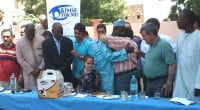The Middle Eastern voice of Europe — Natacha Atlas

Date posted: May 5, 2013
İLHAN GÖKALP/TUĞBA ÜLGER, LONDON
Many of her fans would say her songs touch their soul, with the rhythmic patterns of her smooth voice combining Arab and Western flavors in a harmonious bridge between East and West.
Born to a father of Arabic-Jewish ancestry and a British mother, singer Natacha Atlas is among the most popular British Arab artists. The Anglo-Egyptian singer was born in Belgium but moved to Northampton, England, at an early age. She began her career at the age of 24 when she moved back to Belgium. Atlas became the lead singer of a Belgian salsa band and later of Transglobal Underground, which mixed Eastern and Western sounds.
Atlas is among 12 renowned artists who composed music for poems written by Turkish Islamic scholar Fethullah Gülen for the album “Colors of Peace — Rise Up,” earlier this year. Gülen is recognized for his global message of peace and interfaith dialogue and this album reflects harmonious beliefs on tolerance. Atlas tells Sunday’s Zaman her thoughts on the “Colors of Peace — Rise Up” project, Sufism and the Arab Spring.
You selected to compose music for the poem “Continuous Beauty” out of the poems that were proposed to you for the “Colors of Peace–– Rise Up” album. Why did you choose this poem?
We chose out of maybe between 10 to 15 poems, and the one I picked was the one I felt was very romantic but also had a very spiritual nature to it. So it could be about personal love or even your relationship with God, and I’ve always found that kind of subject very appealing. I felt that we could do that [poem] the most justice in terms of expression and translation into Arabic, and so that’s why we chose that one.
Did you know much about Fethullah Gülen before you were introduced to his poems for this project?
Actually I’d heard of his name, but I knew very little about him. In fact, I learned about him later on… I heard a lot of rumors about him and his controversial book, but then other people said he promotes dialogue. I think that anyone who is in a position where they are spiritual leaders and have something to do with religion is always going to be controversial and it’s always going to be for some people dangerous or contentious. That’s always going to be the way it is, but I generally get a good feeling about him. Being of Arab and Middle Eastern origin, I have a predisposition to spiritual matters and I have closeness to that. I probably also have a romantic nature towards the spiritual subject, Sufism in particular, but all religions.
What is the meaning of this project to you and what do you expect it to give to the world?
Well, some people have said that it could help to promote peace and more dialogue, especially with people of different cultures and different religions. I’m not sure. I just think it’s going to be a nice record and, like I said before, I have sympathy towards Islamic poetry. I think there has been some beautiful Islamic poetry in the past and I still think there is more possible today with new poets, and so I hope it promotes something of beauty.
Can you tell us about your relationship with Sufism?
I have always been interested in the Sufi side of Islam, the spiritual side, and I guess my interest in Sufism probably started more on the musical side because I found the music very intimate and very meditative. You can really meditate on some Sufi music so that inspired my interest. I think that some of the philosophy in Sufi music is actually older than Islam itself, it comes from other sources and then philosophy developed in the Sufi tradition, and there are many branches of it.
You have made references to religion in your albums before. Have you ever hesitated about Western critics disparaging you?
I have sung the adhan a couple of times over the years in different albums, and the first time I did it I was hesitant — I was afraid of the reaction I might get from Islamists in the Middle East because I am a woman. I remember being in America the first time I sang the adhan; I think it was on a single that I had released and there was a group of Palestinian young men who were outside the club that I was singing [at]… They approached me and said, ‘We just wanted to say we heard you singing the adhan,’ and I thought, ‘Oh my God, they are going to tell me you are a woman, you’re not allowed to do this,’ and they said, ‘Please do it again, we love it.’ I was so surprised because I thought I was going to be criticized. And then from the Western perspective it’s difficult because you feel that you’re going to be criticized for different reasons because they might view [me] as a religious zealot, and so I’ve been hesitant.
You have a large fan base in Turkey. What kind of a relationship do you have with Turkey?
I have had a relationship with Turkey for a long time; I’ve gone there [many times] over the last 15 years. I’ve been invited to play at festivals there and I’ve worked with a lot of Turkish musicians. Recently I was at the Ghetto Club in İstanbul, where I worked with three Turkish musicians and two of my musicians from London. I have always loved Turkey and I always loved İstanbul, and there are many Turkish musicians of very high quality. I have a great fondness for Turkish music and I think one of my dreams [is] to go and study at a conservatory for three months in İstanbul. İnşallah [God-willing] one day, if I get the time, but I think that I could learn a lot from their [Turkish] music theory and when I go to play in Turkey I always have a very warm response from the Turkish people [and] so I look forward to going back.
What are your thoughts on the recent developments in the Arab world?
I think when the revolution first happened, a lot of us were under the impression that things were going to resolve fairly quickly and now we see that it’s actually something that is going to take much longer to resolve than we all initially thought. And, like some people say, it’s a process of elimination with the Arabic democracy because for the Egyptian people they are kind of still learning what is possible and what is not possible, and they’re getting stronger and stronger. I think they managed to get a lot more people in positions of power — like judges — on the side of the people. Even some of the judges had said no to Mohammed Morsi on some of the demands he was trying to make, so personally I don’t think Morsi is right for Egypt to be the president and I think that a lot of Egyptian youth don’t think that he is right, either. It’s going to take time for the Egyptians to really be in complete agreement with who should be leading the country. I just don’t think it’s Morsi. Tariq Ramadan called it [an] Arab awakening, and I think awakenings always take time so you know it is not an overnight process. It is important to remain optimistic, especially if you’re trying to support the Egyptian youth, who are trying hard to be resilient in the face of adversity … because you have to give them hope as well. That’s kind of what I try to do musically.
In light of the Arab Spring, you did a remix in solidarity with the people struggling in Egypt. What inspired you to create this piece of music?
I really love the video, it’s almost like a snapshot of the revolution and like a memory of what happened. When I see it now I find it quite emotional, but Sammy, who made that remix with me, is also Anglo-Egyptian and neither of us could be there during the time of the revolution; we were watching it from London, which is why we did that song. We did that song that week and we posted it on YouTube and it was our support to the Egyptian people, our way to show our support of what was happening in Egypt.
People express their feelings in their mother tongue, but you have more than one. Which language do you feel allows you to express your feelings the best?
The Arabic language is one of the strongest to express emotion, and it’s just an amazing language: the way it functions, the way it works. I don’t think there’s another language like it so I probably sound very patriotic when I’m speaking about the Arabic language, but some of the best poetry is in Arabic. And for me vocally, with my Arabic style, I prefer the Arabic language to sing in because it’s the easiest way to express emotion and gratitude for what I do with my music. But I am still learning to express myself vocally, using my voice in other languages.
You have worked on a multitude of successful projects. What was the most exciting for you?
One of my most exciting concerts was at the pyramids with Jean Michel Jarre in front of 80,000 people because I’ve never played to an audience that big. But that doesn’t mean to say that’s the most exciting thing I’ll ever do because, for me, anything that you can do creatively and artistically which gives you a chance to do something different is exciting, and anything where you can learn something new can be exciting. Like for now I’m composing the music to a ballet … and it’s a modern ballet so that’s exciting because I haven’t done it before — anything new and challenging can be exciting.
You have also composed soundtracks for some very popular films. Which one would you consider to be your favorite?
I enjoyed writing the song “Kingdom of Heaven.” I wrote that with Harry Gregson-Williams — the composer of that [film’s soundtrack]. We did this song together and I wasn’t sure whether it was going to work, it was in a very high key for me, but it turned out very nice. … I don’t think that in terms of writing music for film I’ve encountered the most exciting thing yet. I’m hoping that it will come, but I will say that when I was in the studio singing for the film “The Hulk,” I found that very exciting because they asked me to do that by seeing the image on the screen and react[ing] emotionally to what I was seeing. That was very exciting, but I’m still hoping that there will be more exciting things to come, inşallah.
And finally, what is next for Natacha Atlas? Do you have any new projects for your fans?
On May 6, I will launch a new album titled “Expressions Live in Toulouse,” which was recorded at the Toulouse National Theater last June with my own band and with Orchestra de Chambre de Toulouse. I’m also composing the music to a modern ballet based on “One Thousand and One Nights.” The choreographer is a famous Frenchman called Angelin Preljocaj of Albanian descent; he is using three pieces of Turkish music from the Ottoman period and the rest will be my music.
Continuous Beauty (Natacha Atlas)
Source: TodaysZaman, 5 May, 2013
Tags: Fethullah Gulen |
























